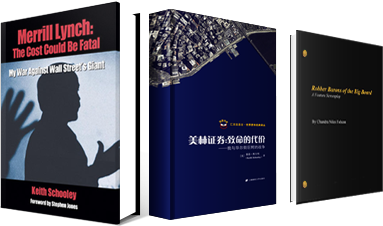Keith Schooley is both a friend and a client. For a period of time, as he outlines in this book, I served as his lawyer in advising him with respect to his conflict with Merrill Lynch. Ultimately, for the reasons that Keith outlines, I could no longer represent him because I was not comfortable in the arbitration setting where his case would be tried. I believed then and now, that in a court of law in front of a jury, Keith would have prevailed.
It was a surprise to me, as I suspect it will be to many people, to know that conflicts with your brokerage house have to be resolved, except in very few instances, through arbitration. While many arbitrators are fair, impartial, and objective, they are not a jury. They are not a representative cross sample of the community from which a jury is selected and their experience and knowledge are often that of a “professional” trier of fact, often with intimate knowledge or personal experiences in the very industry whose activities are under review. Indeed, arbitration often is the exact opposite of the impartial jury drawn from the community at large where most members, if indeed not all of them, have no personal knowledge or experience with the parties, the issue, or the industry. I have frequently stated that the best argument for the jury system in this country is the alternative, and the alternatives are usually a trial to the judge or a trial to arbitrators.
Keith’s experiences set forth dramatically everything that is wrong, unwise, and indeed unhealthy and unfair, about the arbitration proceedings.
There is another aspect here, and that is the story of David versus Goliath. The events complained of took place largely in a small town, Enid, Oklahoma. They involved a local businessman, young and ambitious, a hard worker, a family man, and one active in his community. His opponent was one of the very largest, wealthiest, most successful and prominent brokerage houses in the country. Merrill Lynch is “every man’s broker.” Its reputation has for the most part been favorable, and it is the broker of Main Street, not Wall Street.
Keith’s story, however, sheds an entirely different light on what occurred and may offer an entirely different explanation for Merrill Lynch’s success.
Keith’s story is unusual for yet a third reason. He lost. He admits it. The arbitrators turned him down, his efforts to obtain a jury trial were unsuccessful, and the United States Court of Appeals turned him down on his demand for a jury trial. Keith was not able to persuade any judge or any arbitrator of the correctness of his position. So, like others who have been in that position whose names are far better known—Alfred Dreyfus, Alger Hiss, and indeed Richard Nixon—he has taken his case into the court of public opinion where every reader is a juror. Keith has been fair in presenting the other side’s viewpoint. So, in the final analysis, the reader of his book is one of the jurors he never had, and I leave it to you after careful review to determine whether Keith got a fair shake.
But the story is greater than Keith’s. The real issue here is whether the American stock-buying public is prepared to continue to tolerate indefinitely having claims adjudged by arbitrators rather than jurors. You wouldn’t want your lawsuit against your doctor to be heard by a panel of arbitrators, which might consist of fellow doctors, pharmaceutical salesmen, pharmaceutical company employees, nurses, and people associated with a hospital. You wouldn’t want a lawsuit against a lawyer for malpractice to be heard only by people who were professional judges or who might have an association with the legal profession. Yet, that is basically what happened to Keith. No matter how fair and impartial the arbitrators may have thought they were, the process was unfair and it is the process that more often than not determines the results.
Stephen Jones
Enid, Oklahoma
